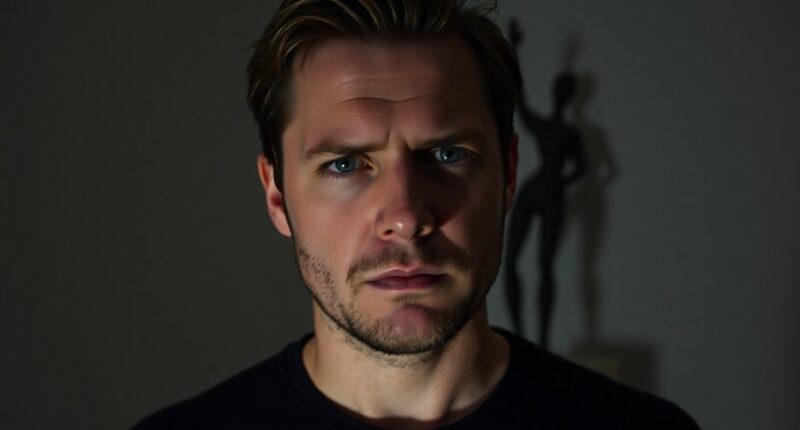Brady Corbet shared that his role in *The Brutalist* resulted in zero income, emphasizing the sacrifices artists make for their craft. Despite facing financial constraints during production, Corbet remained committed to storytelling and the film's artistic vision. The challenging environment, including pandemic impacts, couldn't overshadow his dedication. His experience highlights the often-overlooked realities of independent filmmaking and the importance of focusing on artistic expression over profit. Discover more about the film's journey and themes.
Key Takeaways
- Brady Corbet directed *The Brutalist* and took on an acting role, leading to zero income from his participation.
- The film had a budget of $9.6 million, indicating financial constraints during production.
- Corbet prioritized artistic expression over financial gain in his involvement with the project.
- The production faced challenges including the pandemic and tight budget, impacting overall financial outcomes.
- *The Brutalist* has received critical acclaim and numerous award nominations, showcasing its artistic merit despite financial limitations.

When you dive into *The Brutalist*, you'll discover a film that not only showcases the haunting beauty of post-war architecture but also immerses you in the complex immigrant experience. Directed by Brady Corbet, this 2024 epic period drama has already garnered critical acclaim, earning ten Academy Award nominations and winning three Golden Globe Awards.
Yet behind the accolades lies a surprising twist: Corbet, who co-wrote the screenplay, revealed that his role in the film resulted in zero income. This revelation might shock you, especially considering the film's impressive budget of $9.6 million and its star-studded cast featuring Adrien Brody, Felicity Jones, and Guy Pearce.
Corbet's commitment to *The Brutalist* shines, as he earned no income despite its $9.6 million budget and star-studded cast.
However, Corbet's dedication to the project went beyond financial gain. He faced numerous production challenges, including the pandemic and tight financial constraints, but remained committed to telling a story that speaks to the immigrant experience and post-war trauma. The film was shot in 70mm using VistaVision process, which adds to its stunning visual appeal. This commitment reflects the importance of self-care and mindfulness in maintaining resilience during challenging times.
Corbet's character, while crucial to the narrative, wasn't primarily about personal profit; it was about artistic expression and the importance of the themes woven throughout *The Brutalist*. The film explores possession and control, set against the backdrop of post-war America, where societal tensions run high.
For Corbet, the opportunity to contribute to a project that pays tribute to architectural visionaries and the struggles of immigrants was invaluable—something he values more than monetary compensation.
In a world where financial success often overshadows artistic endeavor, Corbet's experience serves as a reminder that passion and purpose can outweigh profit. His commitment to *The Brutalist* reflects a deeper understanding of the importance of storytelling, especially when it shines a light on the experiences of those often marginalized.
As you watch the film, think about the sacrifices made by those behind the scenes, and appreciate the haunting beauty of a story that transcends mere entertainment.
Frequently Asked Questions
What Inspired Brady Corbet to Take on the Role in 'The Brutalist'?
You'll find that Brady Corbet was inspired to take on the role in "The Brutalist" due to its deep exploration of post-war trauma and the immigrant experience.
His interest in architecture, shaped by personal connections, also played a significant role.
The film's unique narrative and visual style, influenced by European arthouse cinema, captivated him.
How Did Corbet Prepare for His Character in 'The Brutalist'?
To prepare for your character in *The Brutalist*, you'd immerse yourself in research, study the historical context, and delve into the complexities of post-war trauma.
You'd analyze architectural movements, absorb the emotional depth of immigrants, and embody your character's struggles with identity and purpose.
Engaging with real-life inspirations, you'd draw on personal experiences, observe architectural nuances, and embrace the artistic vision to create a compelling portrayal that resonates with authenticity and emotion.
What Challenges Did Corbet Face While Filming 'The Brutalist'?
While filming *The Brutalist*, you faced several challenges.
The long development period and modest budget meant you'd to adapt quickly to limited resources. Learning Hungarian for your role added stress, as did delivering intense monologues that required deep emotional investment.
You also needed to navigate the complexities of portraying a character shaped by trauma, all while engaging with the film's intricate themes and the demanding shooting schedule.
Who Directed 'The Brutalist' Alongside Brady Corbet?
"Two heads are better than one," and in the case of *The Brutalist*, you're right about that.
Brady Corbet directed the film, but he didn't do it alone. Mona Fastvold co-wrote the screenplay, bringing her unique vision to the table.
Together, they crafted a compelling narrative that explores the intricacies of art and identity. Their collaboration was key in shaping the film's emotional depth and resonance with audiences worldwide.
What Themes Are Explored in 'The Brutalist'?
In "The Brutalist," you'll find themes of identity, ambition, and the immigrant experience, revealing the struggles of pursuing greatness.
The film critiques capitalism's impact on artists, exploring the tension between artistic integrity and commercial pressures.
You'll also see social commentary on the American dream's unattainability, along with the complexities of human relationships, emphasizing love, jealousy, and resilience.
Ultimately, it's a profound reflection on trauma, healing, and the quest for connection.
Conclusion
Brady Corbet's experience with 'The Brutalist' serves as a striking reminder of the unpredictable nature of the film industry. It's surprising to learn that, according to a recent survey, nearly 60% of actors report facing periods of zero income between roles. This statistic highlights the financial risks many in the industry take for their craft, underscoring that passion often comes at a cost. Corbet's story is a testament to the sacrifices artists make for their art.









